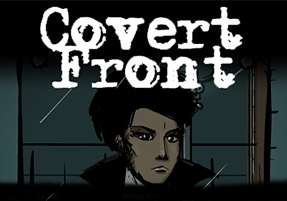Covert Front

A point and click adventure game series created by Mateusz Skutnik of Pastel Games. Skutnik considers the third episode to be his best work so far.
The series takes place in an Alternate History 1904, where a technological revolution in the previous century has led to a premature World War I. In the midst of this conflict, a multitude of specialists from diverse fields are brought to a secretive Berlin conference called "Knowledge for Victory." 96 of those specialists disappeared after the conference ended.
Onto the scene comes secret agent M-24-7-69, aka Kara. Her fellow agents from the Intelligence Agency General Headquarters (IAGH) have disappeared in the course of their own investigations into the whereabouts of those specialists. She is assigned to look into the disappearance of one of the scientists who attended the conference, Karl von Toten. Kara begins by investigating von Toten's now deserted mansion, where there are hints of both a grisly crime and some peculiar scientific experiment in which von Toten was involved.
Kara's investigation of the property and other areas soon turns up clues pointing to something that could have a major impact not only on the outcome of the war, but on the future of technological development. And it appears she is not the only one looking into these strange happenings....
The games released so far are:
- Covert Front Episode 1: All Quiet On The Covert Front
- Covert Front Episode 2: Station On the Horizon
- Covert Front Episode 3: Night In Zurich
- Covert Front Episode 4: The Spark of Life
- Alternate History: Type III.
- Anachronism Stew: Aside from all the highly advanced tech thanks to Alternate History, there's also the fact that the secretive conference was organized by Isaac Newton according to the newspaper in the library. No real mystique surrounds the latter, meaning that the people of this time apparently don't think that it's too unusual; a full explanation is pending.
- Bilingual Bonus: There are quite a few German words and phrases sprinkled about the world. One puzzle solution actually hinges on you figuring out that "Wien" means Vienna.
- The Butler Did It: The first game hints at the butler, Manfred, having been responsible for von Toten's disappearance. It's true; Manfred was an Imperial agent sent to get the machine from his "master" the scientist.
- Clarke's Third Law: A note written by one of the scientists in the bunker to his wife notes how the machine that produces objects from a person's thoughts is more like magic than technology.
- Cool Helmet: Manfred Nikolai's Pickelhaube.
- Dragon with an Agenda: Manfred, both in relation to his master von Toten and to the Empire.
- Dressing as the Enemy: Kara dresses in German officer's clothing to drive out of an airfield.
- Fakeout Escape: In the third episode, Kara pulls this trope off by leaving her coat on the ground and hiding in a high corner of her jail cell, out of sight. The warden passes by and notices the "empty" cell, and when he goes inside and picks up Kara's coat, she gets the jump on him.
- Imperial Germany: The main antagonists are from here.
- Left the Background Music On: The waltz-like music in the intro turns out to be coming from Kara's radio.
- Nothing Is Scarier: The games take a page from Mateusz's other big series in terms of quiet background effects and minimal character interaction.
- Off-Model: Kara's arms seem a bit oddly drawn in the second game.
- Richard Nixon the Used Car Salesman: Borderline. A painting of a young Albert Einstein is on the wall of the hotel room in Zurich. While Einstein did much of his famous work in Zurich, it wouldn't be for decades and in 1904 he was working at the Swiss patent office.
- Scenery Porn: The luscious detail put into every screen really defines the experience.
- Sequel Escalation: Each game gets progressively larger amounts of plot and puzzles. Indeed, the third game has perhaps the most plot of any game at Pastel Games to date.
- Shout-Out: The first game's subtitle, "All Quiet on the Covert Front".
- The chair that appears in Karl von Toten's reality-bending study is the same one that recurs throughout Sub Machine.
- Soundtrack Dissonance: Soothing waltz-like music plays as scenes from the carnage of war are shown in the intro.
- Spinning Paper: Done at the beginning of the first game to set up the whole war backstory.
- Steampunk